#SYSTEM MECHANIC PRO
Text
“doctors refuse to listen to women when they try to explain their health issues; fertility problems, birth complications, and really anything to do with the uterus are all glossed over with whatever the contemporary version of a hysteria diagnosis is; it’s appalling” my feminist sister in Christ you’re the one advocating for women’s health issues to be “solved” by abortion and contraceptives
#when the rubber hits the road they’re just as indifferent to women’s health as the doctors they rail against#whenever they bring up cases where abortion is “necessary” bc the mother is likely to die in childbirth bc of XYZ I’m like.#ok so now you don’t care about modern medicine being all based on the male body?#you don’t care about modern medicine actually studying and understanding the female reproductive system and the mechanics of menstruation a#got it thanks#it’s frustrating to see other women proudly defending something that is so harmful to us in so many ways#pro life#file under caroline#greatest hits
310 notes
·
View notes
Text
Can we just slot away the experiences with those with polyfragmented DID away from DID itself. Cause like. No fucking wonder I didn't realize that I had DID, it's a completely different ballpark.
Like, if you got three ANPs, and the main one has a subsystem with fragments + introjects, no shit are you not going to see a constant interruption of memory. Sure, it's kind of bumpy, but at worst it's just heavy dissociation for a couple of days.
Like. Why have people not made a keen distinction? Why has it been so ignored? I'm frustrated honestly.
Like. Yes, I've always had memory problems, but that can easily be attributed to other things if the symptoms are less severe.
It's honestly fucking frustrating that I run into people that say "tHeRe'S oNlY pOlYfRaGmEnTeD dId" without fucking explaining past the theory of structural dissociation. No theory of structural dissociation is going to HELP ME understand my experiences. Like you're just throwing out words and it's not explaining why or how it works.
It makes me unbelievably pissed. EXPLAIN. Explain that people with a higher tier of structural dissociation have a way more unstable system and that causes a greater number of alters, which lessens dissociative gaps within the fronting group, but may widen the gap between the innerworld alters and fronting alters. Explain how polyfragmented systems work compared to regular DID. Explain that the OSDD-1b label isn't actually what we think it is.
I am tired of stupid fucking idiots on the internet that only deem to quote and paraphrase, instead of doing adequate explanations of what those quoted texts mean. It's absolutely fucking infuriating.
Don't just say that I don't know what I'm talking about, if you're not going to give me adequate reason. These are my experiences, and it's so fucking easy to misconstrue if you're not being overly specific.
And there is literally no damn way to research shit first fucking hand when you need to buy the books, find specific scientific articles or see actual sources. I saw some of you getting mad that we say "DID has little research", but yet to back up your arguments. Why quote something when you barely understand it yourself?
This community needs a fucking overhaul. I am exhausted. We're all just parroting off of each other, as google is not that damn helpful.
I just want more understanding and articulation. Being a polyfragmented system is difficult all on its own, maybe we should understand that the human psyche cannot withstand intense amounts of trauma without breaking down in some form or fashion. It really is confusing that many people try to force the idea that we must face it all alone, you should know that's not how that works.
#post.txt#polyfragmentation#polyfragmented#last part: im talking about how people put such massive emphasis on how final fusion is the only way to heal#but not realizing how that is extremely damaging to those of us who found constant splitting to be our one form of coping mechanism#it just feels impossible to talk to people obsessed with ideas of 'pro recovery'#and find everyone that's straying outside of that to be morally reprehensible#im just tired of interacting with people who don't know what its like#yes I've had fusions- but it was immediately after someone left dormancy#i just know that how my system operates- it's built upon layers of keys and locks..#it's based on some sort of false sense of reality- a pipe dream- that final fusion would be appropriate for a system like ours#of course there's things that i dont know about my system and i have to be okay with that#i just wish other systems would understand what's realistic#and that polyfragmented system needs are different from regular DID
41 notes
·
View notes
Video
M1 Pro 2 drone 4k HD mechanical 2-Axis gimbal camera 5G wifi gps system ...
1 note
·
View note
Link
System Mechanic Pro 22.63 Crack is an all-in-one computer optimization tool that fixes, optimises, and maintains your computer. it is available for download here. Using effective weapon precision tools, you can make your laptop run more smoothly and maintain it free of errors. This will allow it to do tasks more quickly. It trumps every other gadget on the market and surpasses any application that is comparable to it. System Mechanic Pro Activation Key is software that automatically repairs persistent errors, accelerates downloads, and improves online surfing times. Increases both speed and dependability while simultaneously guaranteeing that personal safety is maintained. The user interface of the application is quite straightforward and provides access to a wide range of capabilities, making it suitable even for inexperienced users.
0 notes
Text
What If Their S/O Was The Vice Of Ignihyde?
Type of Writing: #2 - Poll Result
Characters: Jade Leech, Floyd Leech, Kalim Al-Asim, and Jamil Viper
Name: What If Their S/O Was The Vice Of Ignihyde?
Original Poll Link: Here
A/N: I'm dying while writing this🥲
✧⋆⋅⋆⋄✧⋄⋅⋆⋄✧⋄⋆⋅⋄✧⋄⋆⋅⋄✧⋄⋅⋆⋄✧⋄⋆⋆⋄✧⋄⋆⋆⋄✧⋄⋅⋆⋄✧⋆⋅⋆⋄✧⋄⋆⋆⋄✧⋄⋆⋆⋄✧⋄⋅⋆⋄✧⋆⋅⋆⋄✧⋆⋅⋆⋄✧⋄⋆⋅

✧⋆⋅⋆⋄✧⋄⋅⋆⋄✧⋄⋆⋅⋄✧⋄⋆⋅⋄✧⋄⋅⋆⋄✧⋄⋆⋆⋄✧⋄⋆⋆⋄✧⋄⋅⋆⋄✧⋆⋅⋆⋄✧⋄⋆⋆⋄✧⋄⋆⋆⋄✧⋄⋅⋆⋄✧⋆⋅⋆⋄✧⋆⋅⋆⋄✧⋄⋆⋅
🍄 He was interested in you from the start of your first year together
🍄 You were just so shy and reserved, it sprouted a new form of entertainment for him, and he'd be lying if he said your reactions to his teasing weren't enjoyable!
🍄 The first time he met you was because of when he needed to grab something for Azul and he walked inside the board-game club's room and found you messing around with Idia and laughing at Azul's concentration face
🍄 His heart fluttered unnaturally and he put on a plastered smile, while internally he was wondering what that feeling was, and he found out fast
🍄 When Jade asked you out, he chuckled as you tried hiding your face within your over-sized jacket
🍄 As you guys aged upon and into your second-year, he would joke around about how you really were made for one another, with you and him being far more extroverted than your housewardens, and how you both were the vices of your opposing dorms
🍄 Jade loves to walk into Ignihyde, prompting your fellow members to hide himself away from the intimidating eel-mer as you just hide yourself away as he carries you away
🍄 He calls you if there is an incident and they need some information on a certain person, and he uses his stance as your boyfriend to his advantage, and he also uses a few secrets that you guys have shared together against you
🍄 He's a pro-blackmailer like you are, and it makes Azul and Idia nervous, just how much do you guys have on them exactly?
✧⋆⋅⋆⋄✧⋄⋅⋆⋄✧⋄⋆⋅⋄✧⋄⋆⋅⋄✧⋄⋅⋆⋄✧⋄⋆⋆⋄✧⋄⋆⋆⋄✧⋄⋅⋆⋄✧⋆⋅⋆⋄✧⋄⋆⋆⋄✧⋄⋆⋆⋄✧⋄⋅⋆⋄✧⋆⋅⋆⋄✧⋆⋅⋆⋄✧⋄⋆⋅

✧⋆⋅⋆⋄✧⋄⋅⋆⋄✧⋄⋆⋅⋄✧⋄⋆⋅⋄✧⋄⋅⋆⋄✧⋄⋆⋆⋄✧⋄⋆⋆⋄✧⋄⋅⋆⋄✧⋆⋅⋆⋄✧⋄⋆⋆⋄✧⋄⋆⋆⋄✧⋄⋅⋆⋄✧⋆⋅⋆⋄✧⋆⋅⋆⋄✧⋄⋆⋅
🎭 Floyd, much like Jade, was interested in you from the very beginning of your time at Night Raven College
🎭 He met you because of a deal Azul wanted to propose to you, that being you would lend him some of your assistance with Mostro Lounge's mechanics while he gives you a form discount
🎭 This tweel was the one Azul sent to grab you, while he initially wanted Jade to, the fancy male stated how he needed to grab a few things of mushroom from the science room, claiming it might become a air-infesting poison if not taken out for an hour or so
🎭 So, unfortunately, he ordered Floyd to grab you, in which your future boyfriend giggled and began his peppy trip to Ignihyde, where you lead as the vice-housewarden
🎭 Many did not expect to see you guys hanging around one another afterwards, because of how introverted you were compared to his shameless and outgoing-self
🎭 But, when everyone in the college found out you both were an item, they freaked the hell out, especially Idia
🎭 Your housewarden was not fond of the tweels at all, they freaked him out more than crowded areas, and we all know how much those make him shiver...
🎭 Anyways, Floyd loves to kick down the mirror-gateway to your dorm when he's trying to hide from Azul and his work, and, because he knows his boss is going to go looking in his room, he goes to yours
🎭 And your room is being constantly monitored from cameras, in which you can make a small security system make the men chasing Floyd give up as soon as it comes out
�� Loves how cute you are when you blush, it's like a thing for Floyd, he just likes seeing you squeak and hide away as he tries pinching and pocking your tomato-colored cheeks while teases fly out of his mouth
✧⋆⋅⋆⋄✧⋄⋅⋆⋄✧⋄⋆⋅⋄✧⋄⋆⋅⋄✧⋄⋅⋆⋄✧⋄⋆⋆⋄✧⋄⋆⋆⋄✧⋄⋅⋆⋄✧⋆⋅⋆⋄✧⋄⋆⋆⋄✧⋄⋆⋆⋄✧⋄⋅⋆⋄✧⋆⋅⋆⋄✧⋆⋅⋆⋄✧⋄⋆⋅

✧⋆⋅⋆⋄✧⋄⋅⋆⋄✧⋄⋆⋅⋄✧⋄⋆⋅⋄✧⋄⋅⋆⋄✧⋄⋆⋆⋄✧⋄⋆⋆⋄✧⋄⋅⋆⋄✧⋆⋅⋆⋄✧⋄⋆⋆⋄✧⋄⋆⋆⋄✧⋄⋅⋆⋄✧⋆⋅⋆⋄✧⋆⋅⋆⋄✧⋄⋆⋅
☀️ Oh my, how much does this guy love you? It's beyond any kind of scale's listing, no matter the size of strength!
☀️ Kalim first met you because one of your fellow Ignihyde students were requested to help with setting up a mechanical device in Scarabia for a party Kalim was throwing
☀️ And, when that member got sick and couldn't leave his dorm, he sent Jamil a text, recommending you to replace him as he heals from his illness
☀️ Seeing you walk through the hot dorm with a heavy jacket on, despite the heat, he got interested and began to hop around you and ask you questions
" So, what's your name? Where are you from? What's it like helping Idia with managing that really cool dorm? Is it super cold in Ignihyde, and is that why you always wear that jacket? What do you want to do after graduation? How did you get to be so pretty-looking? "
☀️ Kalim did make you very nervous at first, but, after a few pep-talks with his good friend, Jamil, he got to understand exactly why you were so hidden with him
☀️ When you guys got together, it was basically the relationship troupe of opposite-attract, or in other words, the sun and the moon dynamic
☀️ Everybody in Scarabia adores watching you hide in your hoodie as Kalim compliments you, and Jamil likes how you're able to teach Kalim some things that even he deems complicated, like the makeup of a computer
✧⋆⋅⋆⋄✧⋄⋅⋆⋄✧⋄⋆⋅⋄✧⋄⋆⋅⋄✧⋄⋅⋆⋄✧⋄⋆⋆⋄✧⋄⋆⋆⋄✧⋄⋅⋆⋄✧⋆⋅⋆⋄✧⋄⋆⋆⋄✧⋄⋆⋆⋄✧⋄⋅⋆⋄✧⋆⋅⋆⋄✧⋆⋅⋆⋄✧⋄⋆⋅

✧⋆⋅⋆⋄✧⋄⋅⋆⋄✧⋄⋆⋅⋄✧⋄⋆⋅⋄✧⋄⋅⋆⋄✧⋄⋆⋆⋄✧⋄⋆⋆⋄✧⋄⋅⋆⋄✧⋆⋅⋆⋄✧⋄⋆⋆⋄✧⋄⋆⋆⋄✧⋄⋅⋆⋄✧⋆⋅⋆⋄✧⋆⋅⋆⋄✧⋄⋆⋅
🐍 A reserved man with a reserved S/O, what a great mix
🐍 When you first were announced to be the vice-housewarden of Ignihyde, Jamil literally just though you were going to be as camera-shy as your housewarden was
🐍 When in reality, you were far more reserved and had a larger habit of isolating yourself from larger groups than anything else
🐍 He had to appreciate you after you joined forces with your newest friend, Yuu, and the Octavinelle Trio to help break him out of his overblot at the start of the year
🐍 Your knowledge is something that makes your boyfriend proud of you, he's not any easy person to lose in a conversation, yet, you somehow manage to do it when you bring technology into the mix
🐍 Jamil rarely ever smiles with genuine affection, but, when you start rambling about how amazing something that you made or found was, he found himself suppressing laughs as you glared at the piece of machinery you were working on
🐍 Due to his role as Kalim's overseer, Jamil rarely ever gets a break, but, when you noticed how is eyebags were just as bad as your housewarden's, Idia's, were, you jumped into action
🐍 You had made a small model of robots from a story that Kalim loved as a child, and still loves, into small figurines that he could literally wind up and watch the story go by
🐍 When he walked in and watched as Kalim sat silently and enjoyed the show, you just hugged him and said Kalim would be ready for bed in a few minutes, and you just nudged for him to clean the kitchen with your help before going to rest
🐍 Whenever your housewardens have something to do in a meeting, you both help them carry out their roles, so, you guys may get busy from time-to-time with that, but, you guys always make time for one another
#Twisted Wonderland#Twst#Octavinelle#Scarabia#Night Raven College#NRC#Twisted Wonderland x Reader#Twst x Reader#Octavinelle x Reader#Scarabia x Reader#Night Raven College x Reader#NRC x Reader#S/O! Reader#GN! Reader#Jade Leech#Jade Leech x Reader#Floyd Leech#Floyd Leech x Reader#Kalim Al Asim#Kalim Al Asim x Reader#Jamil Viper#Jamil Viper x Reader
541 notes
·
View notes
Note
If your taking requests, I liked to see your sonic and tails if they were closer to their actual animal size difference.
January 9 2024
Doodle Request #5!
You have no idea what you've done. This doodle request has made me spiral into making my own self indulgent au.



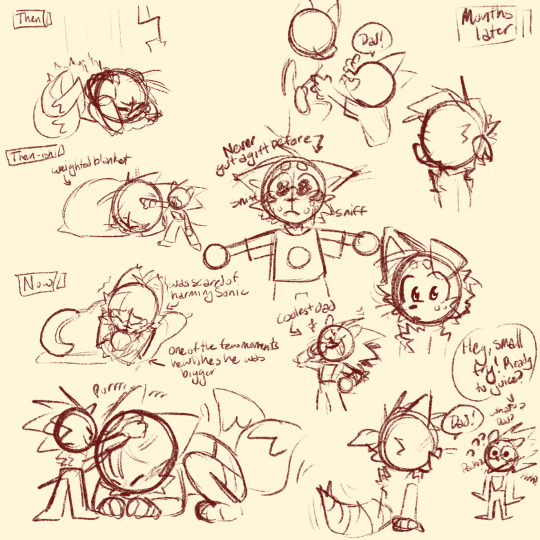
I've never more times in my life used 'cause I want to' as an excuse for something. This entire au is just self indulgent fluff. At first, I looked at the request and went 'oh, they probably don't realize how small hedgehogs are or how big baby foxes are.' and then I was like 'okay, but Mobian'. AND THEN I was like 'okay, but it'd be funny if Sonic was like- almost an adult in this drawing.' and it just spiraled into this. I want to make so many more doodles of this au FUCK.
So everything isn't set in stone yet, aside form their ages I think.
Amy is 19, she's studying to become a teacher. She works at a daycare.
Sonic is 22, he picks up odd jobs where ever he travels in his van.
Tails is 8, he also picks up odd jobs, but more mechanically centered ones (and way less jobs because Sonic will not allow the kit to overwork himself).
Knuckles is 23, he guards the Master Emerald still, but he also is a pro at arts and crafts (mostly pottery).
I know I wrote 'plane' in the doodles (if you can even read them, my handwriting is a nightmare there), but I was originally thinking van that Tails later modifies into a plane-van combo.
Do they have powers? Yes. Because I want them to. Are there magical gemstones? Yes. Because I want there to. Is Eggman trying to take over the world? Eh, I don't think so. I like chill vibes, plus how is Sonic gonna beat up a Motobug if he isn't even as tall as the tire? Why are they wearing clothes? Because I want them to! Why is everyone but Tails aged up? BECAUSE I WANT THEM TO (and it's funny to me).
Sonic and Tails live in a van (that he stole) and travel around. Sure, Sonic has super speed (he's not afraid of showing it off), but he just likes driving (he had to diy an entire system just so he could drive). Plus, it's fortunate that he stole that van, because carrying around supplies needed for a toddler already twice your size when you met them is definitely not light.
#sonic the hedgehog#dadnic#miles tails prower#tails the fox#amy rose#knuckles the echidna#sonic fanart#sonic au#doodle request#I wanna draw more of this so bad and continue baking with this idea. But it's so self indulgent I'm cringing.#Doodling all of these made me so giddy wtf??#I have no idea what to call this au.#I drew all of these while half asleep- I couldn't sleep until I got those down.#Roadtrip!Sonic AU
526 notes
·
View notes
Text
i learned what is the most bizarre government in world history?
A bit strange that no one speaks of Italian city-states here.
I think they tried just every conceivable form of government. I will tell a bit about my dearest Florentine Republic.

In 13th century, Italian city-states witnessed an intense fight between pro-Emperor and pro-Pope factions. Most nobles were pro-Emperor. Florence was one of the places where they lost the battle, which led to the establishment of democracy.
Of course, this democracy was very different from what we call democracy today. Modern Western countries are representative democracies where people only vote in the elections and countries are governed by professional politicians. A medieval Italian would call such system aristocratic.
Of course, Florentine democracy was also exclusive. Wage labourers, people in debt and women were excluded. But all others could directly participate in government of their country: 5,000–8,000 people out of 25,000–50,000 adult citizens.
Political parties were forbidden (actually, the word party was invented as a slur, something that people do not remember now). Elections were seen as aristocratic mechanism because the rich and the educated would be capable to convince or bribe others to vote for them. So the main mechanism of democracy was casting lots.
Florence was subdivided into four quarters, sixteen neighborhoods and twenty-one corporations (seven major ones representing rich citizens and fourteen minor ones representing poor citizens): every citizen was a member of one of those. Initially, corporations had something to do with profession. Nobles renounced their nobility and joined corporations to be able to participate in the government. For instance, nobleman Dante Alighieri entered the corporation of Doctors and Apothecaries, and the ancestors of Niccolo Machiavelli registered in the corporation of Winemakers.
The main government body was Signoria. It consisted of eight Priors (two representing every quarter, six representing major corporations and two representing minor corporations) and one Gonfalonier of Justice, the chairman. They ruled the city during the period of two months only and then replaced by others. Signoria was the main legislative and executive authority. However, it could take major decisions only in common with other bodies such as Twelve Good Men (three persons from every quarter, mostly rich people) and Sixteen Gonfaloniers (one from every neighbourhood). These three bodies (Signoria, Twelve Good Men and Sixteen Gonfaloniers) were all chosen by lot: notes with their names were chosen from special leather bags preserved in the sacristy of the Santa Croce cathedral.
The laws were approved by the Council of the Commune (192 people, 48 from every quarter, majority rich) and the Council of the People (160 people, 10 from every neighbourhood, majority poor).
There was an enormous quantity of other governing bodies that regulated everything that needed to be regulated in the Republic, from quality checks of the bread to the licensing of the sex workers. In most cases, people served from three to six months. It meant that every full-fledged male citizen of the Florentine Republic could hope to be chosen for one of these positions.
The judicial and military power belonged to the podestà, a foreign citizen with good reputation, legal education and a military company or at least a group of armed servants. Florentines believed that a foreigner would be a more impartial judge in Florentine discussions. A podestà was invited to Florence for six months.
Finally, the Medici family managed to circumvent the system and become rulers of Florence but it took time. The system of checks and balances did work.
However, no one was able to circumvent the government system of Venetian Republic. Do you know why?
For more than five centuries (from 1268 to 1797) the procedure to elect the doge (chief of state) did not change.
Choose 30 members of the Great Council by lot.
These 30 people are reduced by lot to 9.
These 9 people choose 40 other people.
These 40 are reduced by lot to 12.
These 12 people choose 25 other people.
These 25 people are reduced by lot to 9.
These 9 people choose 45 other people.
These 45 people are reduced by lot to 11.
These 11 people choose 41 other people.
These 41 people elect the doge.
Funny that many Americans blame their electoral system for being complicated. You may think what you want about the Venetian system but it guaranteed what was probably the most stable government in the history of mankind.
By the way, despite the fact he was elected for life, the power of the chief of state in Venice was very much limited.
He could not appear in public without other officials present (security from populism). He could not meet foreign diplomats or open foreign dispatches without other officials present (security from collusion with foreign governments). He could not possess any property in a foreign land.
However, he had a nice place to live.

840 notes
·
View notes
Text
(Don't) Incentivise Ethical Behaviour

In the ongoing project of rescuing useful thoughts off Xwitter, here's another hot take of mine, reheated:
"Being good for a reward isn’t being good---it’s just optimal play."
The quote comes from Luke Gearing and his excellent post "Against Incentive", to which I had been reacting.
My thread was mainly intended as a fulsome nodding along to one of Luke's points. It was posted in 2021, and extended in 2023 after Sidney Icarus posed a question to it. So it is two threads.
Here they are, properly paragraphed, hopefully more cleanly expressed:
+++
(Don't) Incentivise Ethical Behaviour
This is my main problem with mechanically rewarding pro-social play: a character's ethical choice is rendered mercenary.
As Luke Gearing puts it:
"Being good for a reward isn’t being good---it’s just optimal play."
Bear in mind that I'm not saying that pro-social play can't have rewarding outcomes for players. Any decision should have consequences in the fiction. It serves the ideal of portraying a living, world to have these consequences rendered diegetic:
The townsfolk are thankful; the goblins remember your mercy; pamphlets appear, quoting from your revolutionary speech.
What I am saying is that rewarding abstract mechanical benefits (XP tickets, metacurrency points, etc) for ethical decisions stinks.
+
A subtle but absolutely essential distinction, when it comes to portraying and exploring ethics / morality, in roleplaying games.
Say you reward bonus XP for sparing goblins.
Are your players making a decisions based on how much they value life / the personhood of goblins? Or are they making a decision based on how much they want XP?
Say you declare: "If you help the villagers, the party receives a +1 attitude modifier in this village."
Are your players assisting the community because it is the right thing to do, or are they playing optimally, for a +1 effect?
+
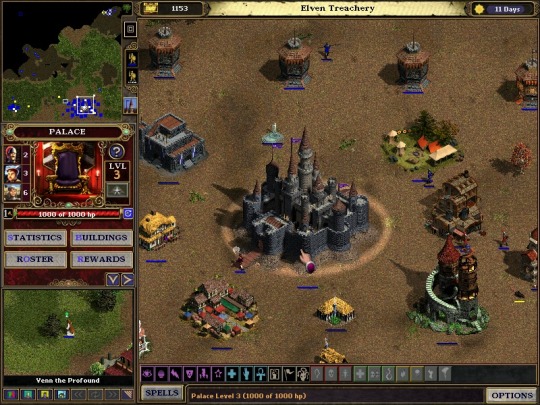
XP As Currency
XP is the ur-example of incentive in TTRPGs. It began with D&D's gold-for-XP, and has never strayed far from that logic.
XP is still currency. Do things the GM / game designer wants you to do? Get paid.
Players use XP to buy better mechanical tools (levels, skills, abilities)---which they can then in turn use to better perform the actions that will net them XP.
Like using gold you stole from goblins to buy a sword, so you can now rob orcs.
I genuinely feel that such systems are valuable. They are models that illuminate the drives fuelling amoral / unethical behaviour.
Material gain is the drive of land-grabbing and colonialism. Logger-barons and empires do get wealthier and more privileged, as a reward for their terrible actions.
+
If you want to present an ethical choice in play, congruent to our real-life dilemmas, there is value in asking:
"Hey, if you kill the goblins you can grab their treasure, and you will get richer. There's no reward for sparing their lives, except that they are thankful."
Which is another way of asking:
"Does your commitment to the ideal of preserving life outweigh the guaranteed material incentives for taking life?"
The ethical choice is the difficult choice, precisely because it involves---as it often does, in real life---sacrificing personal growth and gain. Doling out an XP bounty for doing the right thing makes the ethical choice moot.
"I as the player am making a mechanically optimal choice, but my character is making an ethical choice!"
A cop-out. Owning your cake and eating it too. The fictional fig-leaf of empathy over a calculated a decision to make profit.

+
Sidney Icarus asks a question which I will quote here:
"... those who hold to their beliefs of good behaviour don't feel rewarded, and therefore feel punished. And that's not a good feeling.
It's an unpleasant experience to play a game where the righteous players are in rags, and the mercenary fucks have crowns and sceptres.
So, what's the design opportunity? How do we make doing the right thing feel pleasant without making it mercenary? Or, like reality, do we acknowledge that ethical acts are valuable only intrinsically and philosophically?
I have no idea how to reconcile this."
I would suggest that the above dichotomy---"righteous players in rags, mercs in crowns"---is true if property is recognised as the only true incentive.
+

Friends As Property
Modern games try to solve the righteous-players-in-rags "problem" in various ways. Virtue might not net you treasure or XP, but may give you:
Contact or ally slots, which you can fill in;
Relationship meters you can watch tick up;
Favour points you can cash in later;
etc.
How different are these mechanical incentives from treasure or XP, really?
Your relationships with supposedly living, breathing beings are transformed into abilities for your character: skills you can train; powers you can reliably proc. Pump your relationship score with the orc tribe until calling on them for reinforcements becomes a once-per-month ability.
Relationships become contracts. Regard becomes debt. Put your friend in an ally slot, so they become a tool.
If this is what you want play to be---totally fine! As stated previously, games say powerful things when they portray the engines of profit and property.
But I personally don't think game designers should design employer-employee relationships and disguise these as instances of mutual aid.
+
Friends As Friends
In the OSR campaigns I'm part of, I keep forgetting to record money. Which is usually a big deal in such games, seeing as they are in the grand tradition of gold-for-XP?
In both games, my characters are still 1st-Level pukes, though it's been months.
I'm having a blast, anyway.
My GMs, by virtue of running organic, reactive worlds, have made play rewarding for me. NPCs / geographies remember the party's previous actions, and respond accordingly.
I've been given gills from a river god, after constant prayer;
I've befriended a village of monsters, where we now live;
I've parleyed with the witch of a whole forest, where we may now tread;
I've a boon from the touch of wood wose, after answering his summons.

I cannot count on the wood wose showing up. He is a character in the world, not a power I control. Calling on the wood wose might become a whole adventure.
Little of this stuff is codified my stats or abilities or equipment list. They are mostly all under "misc notes".
Diegetic growth. Narrative change that spirals into more play.
This is the design opportunity, to me:
How do we shape TTRPG play culture in such a way that the "misc notes" gaps in our games are as fun as the systemised bits? What kinds of orientation tools must we provide? What should we say, in our advice sections?
+
A Note About Trust
The reason why it is so hard to imagine play beyond conventional incentive structures has a lot to do with trust.
Sidney again:
One of the core issues is the "low trust table". I'm not designing just for myself but for my audience. For a product. How much can I ask purchasers and their friends to codesign this part with me?
Nerds love numbers and things we can write down in inventories or slots because they are sureties. We've learned to fear fiat or player discretion, traumatised as we are by Problem GMs or That Guys.
The reason why the poverty in Sidney's hypothetical ("righteous players are in rags") sounds so bad is because in truth it represents risk at the game table. If you don't participate in the mechanics legible to your ruleset (the XP and gear to do more game things), you risk gradually being excluded from play.
You have no assurance your fellow players will know how hold space for you; be considerate; work together to portray a living world where NPCs react in meaningful ways---in ways that will be fun and rewarding for everybody playing.
You are giving up the guarantee of mechanical relevance for the possibility of fun interactions and creative social play.
+
The "low trust table" is learned behaviour--the cruft of gamer culture and trauma.
When I game with folks new to TTRPGs, they tend to be decent, considerate. I think there's enough anecdotal evidence from folks playing with school kids / newcomers / etc to suggest my experience is not unique.
If the "low trust table" is indeed learned behaviour, it can be unlearned.
Which rules conventions, now part of the hobby mainstream, were the result of designers designing defensively---shadowboxing against terrible players and the spectre of "unfairness"?
How can we "undesign" such conventions?
Lack of trust is a problem that we have to address in play culture, not rulesets. You cannot cook a dish so good it forces diners to have good table manners.
+
This is too long already. I'll end with an observation:
Elfgames are not praxis, but doesn't this specific dilemma in the microcosm of our silly elfgames ultimately mirror real-world ethics?
To be moral is to trust in a better world; to be amoral / immoral is to hedge against the guarantee of a worse one.
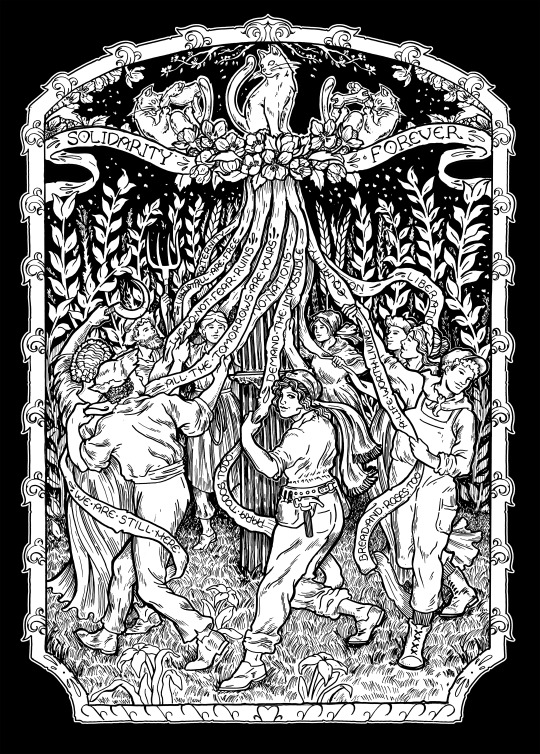
+++
Further Reading
Some words from around the TTRPG community about incentive and advancement in games:
+
However, the reason there is a big debate about this is that behavioural incentives in games clearly do work, either entirely or at various levels. This applies outside gaming, as well. Why do advertising companies and retail business use "rewards" structures to convince people to buy more of their products? Why do people chase after "Likes" on social media?
A comment by Paul_T to "A Hypothesis on Behavioral Incentives"
from a discussion on Story-Games.com
+
the structure and symbolism of the D&D game align with certain structures and values of patriarchy. The game is designed to last infinitely by shifting goalposts of character experience in terms of increasing amounts of gold pieces acquired; this resembles the modus operandi of phallic desire which seeks out object after object (most typically, women) in order to quench a lack which always reasserts itself.
D&D's Obsession With Phallic Desire
from Traverse Fantasy
+
In short, my feeling is that rewarding players with character improvement in return for achieving goals in a specific way impedes some of the key strengths of TTRPGs for little or no benefit in return.
Incentives
from Bastionland
+
When good deeds arise naturally out of the players choices, especially when players rejected other options that were more beneficial to them, it is immensely satisfying. Far more than if players are just assumed to be heroic by default. It gives agency and meaning to player choice.
Make Players Choose To Be Kind
from Cosmic Orrery
+
Much has been made about 1 GP = 1 XP as the core gameplay loop driver of TSR D+D. But XP for gold retrieved also winds up being something of a de facto capitalistic outlook as well. Success is driven by accumulation of individual wealth -- by an adventuring company, even! So what's a new framework that can be used for underpinning a leftist OSR campaign?
A Spectre (7+3 HD) Is Haunting the Flaeness: Towards a Leftist OSR
from Legacy of the Bieth
+
Growth should be tied to a specific experience occurring in the fiction.
It is more important for a PC to grow more interesting than more skilled or capable.
PCs experience growth not necessarily because they’ve gotten more skill and experience, but because they are changed in a significant way.
Cairn FAQ
from Cairn RPG / Yochai Gal
+++
Thank you Ram for the Story-Games.com deep cut!
( Image sources:
https://knowyourmeme.com/memes/neuron-activation
https://en.wikipedia.org/wiki/Majesty:_The_Fantasy_Kingdom_Sim
https://www.economist.com/sites/default/files/special-reports-pdfs/10490978.pdf
https://varnam.my/34311/untold-tales-of-indian-labourers-from-rubber-plantations-during-pre-independence-malaya/
https://nobonzo.com/ )
+
PS: used with permission from Sandro, art by Maxa', a reminder to self:
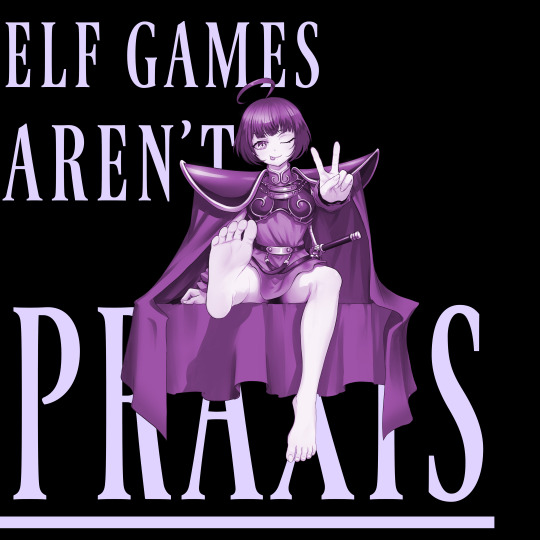
247 notes
·
View notes
Text
Introduction to the OSR
what's an OSR? it's a game that's kinda like old-school D&D. or is old-school D&D. or is compatible with old-school D&D. an OSR game generally has some or all of the following principles:
low character power with highly lethal combat. in old-school D&D a 1st-level fighter has d8 hit points and a longsword does d8 damage, and you die at 0HP. this is not to ensure characters die all the time but to emphasize the next bullet point:
emphasis on creative problem solving. most situations cannot be solved by straightforward use of your abilities (such as charging into every situation with swords drawn, if a fighter), so the game tests lateral, outside-the-box thinking.
emphasis on diegetic progression. spells are found, not obtained automatically on level-up. you get XP by finding gold more than killing monsters. most of your cool abilities come from magic items. making alliances & hiring followers is encouraged.
focus on managing inventory, resources, risk, and time. the players are constantly faced with meaningful decisions; this is the heart of the game.
very sandbox-oriented. the focus on creative problem solving means the game must be accommodating to players taking a course of action the GM didn't plan for. use lots of random tables to generate emergent story. some elements of new simulationism.
high tactical transparency, i.e., the optimal course of action is rarely system-specific, and ideally very possible for a new player to intuit.
usually semi-compatible with old D&D, but not always. usually rules-lite, but not always.
what does the OSR mostly NOT do?
focus on character builds. these change the focus too much to be on the rules than the fiction, can create situations where stuff everyone should be able to do is an ability locked to one class, and impede tactical transparency.
resolve everything with a die roll. combat uses dice to be scary, unpredictable and most importantly not your default course of action. everything else should bring up dice rarely - dice are your plan B when your plan A fails. the best plans need no dice.
use linear storytelling or put players into a writer/GM role. linear storytelling gets in the way of the decision-making so core to the playstyle; letting players write details into the setting is mutually exclusive with them discovering it.
rules for everything. 400 pages of crunch is worse at simulating a believable world than the GM and players' shared understanding. OSR games rely constantly on GM ruling.
mostly still applies to all the above. making your system a "pure" OSR game comes second to doing what's best for your game.
System recommendations
old D&D or a retroclone
old-school D&D - or old school essentials or basic fantasy or swords & wizardry, which are old D&D's mechanics repackaged with quality-of-life tweaks (and the upside of not giving WOTC your money) - are usually the go-to when recommending someone's first OSR game. they're actually not my first pick, though!
PROS:
very complete, with more robust rules than a lot of the lighter games on this list.
100% compatibility: most OSR adventures are statted for old school essentials. converting them to other OSR systems is usually simple, but not 1-for-1.
easier to find games for. anyone interested in the OSR space knows what old school essentials is.
CONS:
jank. these games largely still have weird saves, level limits for non-humans, some still have descending AC, etc etc. it's not that bad but it is there
i hate thief skills. lots of essential dungeoneering actions are locked to the thief class as abilities, with abysmally low success chances. this is stuff i prefer being handled without a roll. thieves in this system suck and make everyone else worse at dungeon crawling by existing.
there's just lots of really cool shit in other systems i'm about to go into that you just don't get here
Knave 1e and its various hacks
this is a 7-page super-lightweight system that boils everything down to just the essentials.
rolling a character takes like 5 minutes. roll stats, roll gear, roll traits, go. done. it's great.
characters are defined entirely by stats and gear, no classes. wanna be a fighter, have high strength and carry a big sword and armor. wanna be a wizard, have high intelligence and fill your inventory with spells. item slots are elegant and pretty limited.
initiative is instant: roll d6. 1-3, monsters go first. 4-6, PCs go first. swingy, but god it is so smooth and shaves like the most boring 5 minutes off of every combat
monsters are so very elegant. old D&D gives monsters a "hit dice" rating to determine their HP, e.g. a 3HD monster rolls 3d8 for hit points. knave takes this number (HD) and uses it for attack rolls and saves (aside from exceptionally bad/good saves), so a knave statblock looks something like this.
spells are all one or two sentences long & extremely easy to remember.
7 pages is so light. i have the system basically memorized.
DOWNSIDES: there's no dungeon crawling rules (standard for meatier OSR games & something i consider essential) and no real bestiary, though the second point isn't a huge deal cause they're so easy to make. it also kinda assumes you already know how to run OSR games, so there's very little real advice or guidance.
KNAVE HACKS
knave 1e is in creative commons & comes with an editable word doc for you to publish with modifications, so there's a ton of variants (there was a spreadsheet of them somewhere, but i can't find it).
Grave is a favorite - i'm two years into a grave campaign and it's fantastic. it's a dark-souls-y version of knave with some really elegant innovations.
you have a set number of deaths before you for-reals die, as every character plays an undead as is dark souls tradition. makes it good for OSR beginners! being able to tell when you're close to your final death is really good - it lets you emotionally prepare for losing your character & raises the stakes more the more you die. (though honestly you should probably cut the number of extra deaths in half, it's super generous)
XP and gold are combined into one resource, souls. legendary creatures drop big souls you can make into magic items. this has ended up being the coolest thing in my current campaign. my players love finding powerful souls to make into magic items it's so fun
uses preset packages of stats/gear instead of knave's rolled ones, filling the role of more traditional character classes. has the wonderful side effect of not making you get stuck with low stats cause you rolled bad one time.
you have stamina equal to your empty item slots. you spend stamina on spells if you're a caster, or free maneuvers (on top of your attack at no action cost) if you're not. it's super elegant.
there's 3 classes of spells: wizardry for intelligence, holy magic for wisdom, and witch stuff for charisma. nice and intuitive.
there's a page of 50 magic items each a couple sentences long. this PDF is worth it just for the magic items.
DOWNSIDE: see the downsides for knave 1e. all still apply.
i enjoyed grave so much i made a variant of it with the dark souls bits removed (and some dungeon crawl rules added!) to use for my standard fantasy campaigns.
Knave 2e
sadly knave 2e is not purchasable yet (i backed it on kickstarter so i have access, though). but when it comes out i highly recommend it.
much larger and denser than knave 1e. it finally has dungeon crawling rules, it has GM and player guidance, everything is refined and the layout is so so nice and readable.
combat is a bit more interesting than 1e. you can break your weapon against an enemy to deal max damage. you get a free maneuver on high attack rolls.
there's rules for stuff like alchemy, warfare, building a base. it all kicks ass.
there are so many goddamn tables. i rifle through it anytime i need inspiration.
DOWNSIDES: i personally can't think of any! it's a very complete good functional system.
Mausritter
you play tiny little mice! in a world full of big dangerous things that want to eat mice. cat = dragon. you get it. what more could you want
the mouse thing is just super intuitive. you get the dynamic between you and the big scary lethal world. fantastic OSR game to introduce kids
nice and robust ruleset; nothing feels missing
tons of super nice GM stuff! faction rules, tools for rolling up hexcrawls and dungeons, plenty of tables
super clean readable layout. font isn't too small to avoid being intimidating. guidance is really nice and clear.
combat is autohit. super fast & lethal.
100% free
look mausritter is just. good. i wanna run it so bad someday
Worlds Without Number
sort of a middle ground between OSR stuff and 5e.
lots of classes, at least in the paid version. the free version comes with just the warrior, expert and mage. there's feats and more of a focus on builds than most OSR games. if you like more mechanical build variety than a typical OSR game, this is a great game for you!
extremely good multiclassing. y'know how in most games if you just mash together two classes you think are cool you'll end up with a total mess? not here! every combo is viable and works fine! easily the best multiclassing of any game i've touched
an absurd amount of GM stuff and tables. easily more than any of the other stuff i've praised for also having them. but personally i haven't dug into them as much, so i can't really comment on them
skills the way modern D&D has them. you roll dice and try to beat a target number. i don't tend to like rolled skills, but most people do, so if that's your thing WWN has them
DOWNSIDES
the layout is terrible. everything is a huge wall of text with very little use of bold text or bullet points to draw attention to the important bits. the table of contents has like 15 things in it for a 400-page book! i couldn't find any of the paid-version-exclusive classes for like a month after i bought it! looking up rules is a nightmare.
the way the default setting handles "evil races" is like an exaggerated parody of all the problematic aspects of how D&D handles it. like, it wants so bad for you to have an excuse to genocide sentient free-willed people. but at least the default setting is easy to chuck in the trash
Dungeon Crawl Classics
the goal of this system is to take all of the crazy gonzo moments people remember playing old-school D&D in their childhood and turn all of that up to 11 while cutting the stuff that doesn't add to that. i think a lot of its innovations have ended up kind of standard in newer OSR stuff (like fighters getting maneuvers with their attacks), but it still has more to offer.
the funnel: you start the game with four randomly rolled dipshit peasants that you then throw into a meatgrinder to get horribly killed. you pick one of the survivors to be your 1st-level character.
maneuvers: fighters roll an extra die with each attack that gets bigger as you level. if it's a 3 or higher, you get to do a cool thing on top of your attack. pretty standard for OSR games, but this game popularized it!
crit tables: fighters also get more crits and nastier crits as they level. every crit, you roll on the crit table. maybe you chop off a dude's arm. maybe you just knock them over. maybe you shatter their shield. it's very cool
spell tables: i don't really like roll-to-cast mechanics, generally. but DCC goes so all-in on roll-to-cast that it still looks fun as hell to watch. you cast a fireball and maybe it goes how you want. or maybe you explode, or you nuke everything in a half-mile radius, or from now on you permanently ignite flammable materials you touch, or whatever. casters just have to put up with turning into a weird mutated mess across a campaign
there's no dungeon crawl rules, no encumbrance - this game is all about the big over-the-top wacky shit, and is not really interested in the more down-to-earth number crunching. it's more in the you-die-hilariously-all-the-time area of OSR than the you-avoid-death-through-clever-play area. not really my thing but the system knows exactly what it wants to be and i respect it
iron halberd
this one is mine! as the author i'm not qualified to tell you what isn't good about my system, so just assume it's worse than i make it sound, but here's a bunch of the selling points
semi-random character creation where you flip back and forth between rolling dice and getting your own input. roll stats, pick ancestry. pick starting gear kit, roll different dice based on which kit you picked. etc etc. stats are random but all equally viable (no rolling incredibly low or high stats). every time i run this game the character creation is a hit. seriously go roll up a character it'll sell you on the whole thing
you start out a lot stronger than a standard OSR character but grow way more slowly. i don't like 4th-level characters being 4 times as strong as 1st-level ones; HP never gets that high. emphasis is more on diegetic progression instead.
way too many subsystems for alchemy, crafting, strongholds, warfare, renown, rituals, likes 9 pages of magic items, a whole subsystem for becoming a cleric mid-campaign. i couldn't help myself i love this shit
in my current campaign we had a player permanently sacrifice some max HP to become a necromancer after deliberating on whether that's a good idea for like thirty seconds, which instantly made me think my necromancy system is a success
also free
Adventure recommendations
(in rough order of size)
Moonhill Garden (by Emiel Boven): look at this. look at it! this is like the best template for a little dungeon in an OSR game. all of the little factions are tied together. this would be a great oneshot to introduce people to an OSR system with.
A gathering of blades (by Ben Milton): a system-neutral, one-page sandbox. i ran this for an iron halberd game and it went super well. lasted like 7 sessions. highly recommend.
The Waking of Willowby Hall (by Ben Milton): a single dungeon with a million things going on. it's super chaotic with half a dozen different factions crashing into each other and a big angry goose. highly recommend, especially for kids
The Black Wyrm of Brandonsford (by Chance Dudinack): small sandbox with a fun fairytale vibe and a very fleshed-out little town. and a big nasty dragon.
Evils of Illmire (by Zack Wolf): this is a very dense, entire campaign's worth of hexcrawl in a very compact package for like $5. it doesn't do anything particularly new, but the value-for-money is absurd and it's a really good template for how to do a sandbox if you're used to 5e adventures
Ask me anything!
if anything here is unclear or intrigues you, send me asks! i love helping people get into OSR games. i'll link frequently asked questions here if i get any.
#osr#nsr#ttrpg#d&d#iron halberd#knave#worlds without number#dungeon crawl classics#mausritter#l2j archive
312 notes
·
View notes
Text
I've been enjoying the Women's World Cup so much I started thinking of designing a sports-themed RPG, but then I remembered we kind of already did that with Primetime Colosseum, our game about ancient Roman gladiators, in a world where gladiators are basically pro-wrestlers (and also revival potions are a thing)!
In Primetime Colosseum, you play young, up-and-coming gladiators trying not to botch their shot at the big-time. As well as your character, you'll also create your persona - who you are in the ring - and over the game, you'll have to balance how popular your persona is with fans and how popular your character is with the powerful family who run your gladiator school (and who provide revival potions after a crowd-pleasing mortus match)! It's one of 11 system-neutral micro-settings in our anthology, Odd Jobs, so it can work with any system you like (though there's a small bolt-on mechanic within the game to keep track of your popularity).
You can get Primetime Colosseum with 10 other micro-settings in Odd Jobs here (for hardback) and here (for PDF), or you can listen to Jeff and Jonny playing it on the wonderful @partyofonepod here!


308 notes
·
View notes
Note
Large Luigi, from D&D.
So. There's a LOT to unpack here.
Pros:
- he is large and has thick skin, and abberation blood probably isn't even that enticing (beholders are essentially D&D's shoggoths)
- His central eye emanates antimagic. Would that make the undead become temporarily dead? Would they not be able to use their powers? i have no clue
- His eyestalks shoot various beams. The most helpful are probably Charm and Disintegrate
- He is an accomplished chef
- He literally is the supernatural
- He does not need to shave
Cons:
- he could not wear the crucifix, as he has no neck
- he may be too much of a cinnamon roll too good for this world too pure to entertain the Rich Jerk
Excuse me
Nononono you come back here you can't just tell me there's a frickin BEHOLDER called Large Luigi who is both apparently Good aligned and an accomplished chef in... "DnD." Like. WTF. Also you are going to have to be waaaaaaay more specific there is a lot of DnD out there. Is this the day they let Eliot Spencer DM like what is happening.
I think I love him.
The question of whether vampirism is magic in the novel is a complicated one which came up with the Superman ask as well, especially by DnD mechanics. I want to say that if such a distinction exists, vampirism is a spiritual/metaphysical condition, rather than a strictly magical. Some systems draw distinction between magical effects and divine effects, although DnD kinda doesn't - Clerics use spells and things, just like Wizards. Eh? But if an anti-magic field won't automatically disanimate a zombie which I believe it will not - it's nor Free Turn Undead (I don't think??) - then it shouldn't have such an effect on Dracula either.
You know this question has an answer. There's vampires in DnD. Heck, there's Dracula in DnD. Someone go run Curse of Strahd with Large Luigi in it real quick and tell me what happens.
At the very least an anti-magic beam should disrupt Dracula's use of Scholomancy, because Dracula isn't just a vampire, he's also an Evil Wizard who majored in vampirism at Evil Wizard College.
If it came to a fight, I don't think they'd be able to do much to each other. Dracula's saving throws are pretty incredible, so he's not getting charmed or disintegrated. Without magic though, I don't think there's much Dracula can do that would have much effect on a Beholder. Gonna throw a wolf at his eye?? What???
If it comes to escape, I doubt Large Luigi can fit out the window. And the big doors are locked. On the other hand, even several inches of solid oak and iron are probably no match for a disintegration beam. If the situation becomes intolerable, he can probably break down the door and leave.
But you tell me Large Luigi is a cinnamon roll and also a chef. Dracula needs a chef, and he loves tormenting the pure of heart. (The two victims he chooses for himself in the novel are incidentally also the sweetest cinnamon rolls in the cast). Jonathan is sure he has no human servants inside the Castle ... but maybe he keeps Large Luigi and Undead Amelia Bedelia as kitchen staff. How well can Large Luigi roast a chicken? How does he feel about Evangelical vegetables?
Maybe he was there all along, he just wasn't relevant to Jonathan's journey
Anyway yeah my guess would be Large Luigi the Beholder can survive Castle Dracula. Maybe he and the monster eating Dungeon dude can be friends.
64 notes
·
View notes
Video
M1 Pro 2 drone 4k HD mechanical 2-Axis gimbal camera 5G wifi gps system ...
0 notes
Text
"One in five Americans will experience major depressive disorder in their lifetime, and many will not find relief from current therapies. But now researchers have identified an unexpected source of the problem: inflammation.
Inflammation in the body may be triggering or exacerbating depression in the brains of some patients. And clinical trial data suggests that targeting and treating the inflammation may be a way to provide more-precise care.
The findings have the potential to revolutionize medical care for depression, an often intractable illness that doesn't always respond to conventional drug treatments. While current drug treatments target certain neurotransmitters, the new research suggests that in some patients, depressive behaviors may be fueled by the inflammatory process.
It appears that inflammatory agents in the blood can break down the barrier between the body and the brain [and specifically the blood-brain barrier], causing neuroinflammation and altering key neural circuits, researchers say. In people at risk for depression, inflammation may be a trigger for the disorder.
Research suggests that only a subset of depressed patients - roughly 30 percent - have elevated inflammation, which is also associated with poor responses to antidepressants. This inflammatory subgroup may be a key to parsing out differences in underlying mechanisms for depression and personalizing treatment...
The inflamed body and the depressed brain
...A number of studies show that depressed patients tend to have increased inflammation compared with non-depressed subjects, including more inflammatory cytokines and C-reactive protein — which is produced by the liver in response to inflammation — circulating in the blood. Patients with autoimmune diseases have inordinately high rates of depression. And postmortem brain samples from people who died by suicide showed more activation of the brain’s immune cells, which release inflammatory agents.
Crucially, pro-inflammatory drugs can induce people to become depressed, which suggests a causative link. In one seminal study published in the New England Journal of Medicine, Miller and his colleagues conducted a double-blind study of 40 cancer patients undergoing treatment with interferon-alpha, an inflammatory cytokine.
Though none of the patients had depression to begin with, the inflammatory agent had a striking effect: Many became depressed, a finding that has been consistently replicated.
"The patients recognize pretty much immediately that, 'Hey, you gave me something, and now I feel this way. I don't know why I feel this way,'" Miller said.
Can treating inflammation treat depression?
If inflammation can induce or exacerbate depression and its symptoms, then reducing inflammation could provide relief.
Even if inflammation is a disease modifier rather than the cause of the problem, “you have to take care of it in order for you to be able to get your therapeutics working to restore your circuitry and what’s happening in the mind,” said Eleonore Beurel, a professor of psychiatry and behavioral sciences at the University of Miami Miller School of Medicine.
Anti-inflammatory drugs, used alone or in conjunction with a standard antidepressant, may help some depressed patients. A 2019 meta-analysis encompassing almost 10,000 patients from 36 randomized clinical trials found that different anti-inflammatory agents, including NSAIDs, cytokine inhibitors and statins, could improve depressive symptoms...
“We’ve come to the tipping point,” Miller said. “And we know enough at this point to begin to target the immune system and its downstream effects on the brain to treat depression. We are there.”
How to manage your own inflammation
Experts agreed that people should not take anti-inflammatories without talking with their health-care provider. Your doctor can order a C-reactive protein blood test to measure your level of inflammation.
“There are so many patients who do not respond to antidepressants,” said Ole Köhler-Forsberg, a physician and associate professor of psychiatry at Aarhus University who has given anti-inflammatory drugs to his patients in addition to antidepressants. “So there is the issue of how can we improve the individual outcomes.” Tailoring treatment for each individual on a holistic basis may add some benefit.
More clinical tests for inflammatory markers may be a way to differentiate the effectiveness of antidepressant treatment. If confirmed, it would “be the first actual biomarker in psychiatry,” Raison said. “I mean, we’ve been looking for biomarkers for 50 years and had zero luck. And it’s ironic that it’s not a brain chemical.”
In the meantime, “you get much more mileage out of the lifestyle changes than you would out of supplements or any other over-the-counter drugs at this point,” Miller said."
-via The Washington Post (via Yahoo News), February 24, 2023
#depression#cw sui mention#cw suicide mention#inflammation#autoimmune#cytokines#neuroscience#medical news#medical research#anti inflammatory#antidepressants#ssri#mental health#mental illness#good news#hope#way way more details at the source btw
176 notes
·
View notes
Text
The Collective Intelligence Institute
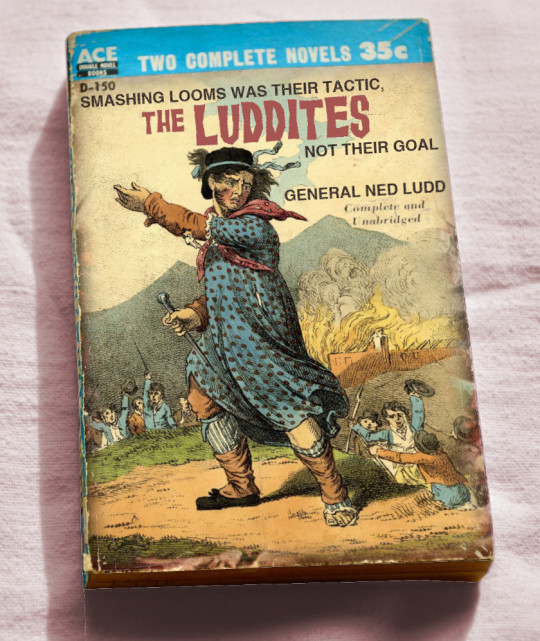
History is written by the winners, which is why Luddite is a slur meaning “technophobe” and not a badge of honor meaning, “Person who goes beyond asking what technology does, to asking who it does it for and who it does it to.”
https://locusmag.com/2022/01/cory-doctorow-science-fiction-is-a-luddite-literature/
If you’d like an essay-formatted version of this post to read or share, here’s a link to it on pluralistic.net, my surveillance-free, ad-free, tracker-free blog:
https://pluralistic.net/2023/02/07/full-stack-luddites/#subsidiarity
Luddites weren’t anti-machine activists, they were pro-worker advocates, who believed that the spoils of automation shouldn’t automatically be allocated to the bosses who skimmed the profits from their labor and spent them on machines that put them out of a job. There is no empirical right answer about who should benefit from automation, only social contestation, which includes all the things that desperate people whose access to food, shelter and comfort are threatened might do, such as smashing looms and torching factories.
The question of who should benefit from automation is always urgent, and it’s also always up for grabs. Automation can deepen and reinforce unfair arrangements, or it can upend them. No one came off a mountain with two stone tablets reading “Thy machines shall condemn labor to the scrapheap of the history while capital amasses more wealth and power.” We get to choose.
Capital’s greatest weapon in this battle is inevitabilism, sometimes called “capitalist realism,” summed up with Frederic Jameson’s famous quote “It’s easier to imagine the end of the world than the end of capitalism” (often misattributed to Žižek). A simpler formulation can be found in the doctrine of Margaret Thatcher: “There Is No Alternative,” or even Dante’s “Abandon hope all ye who enter here.”
Hope — alternatives — lies in reviving our structural imagination, thinking through other ways of managing our collective future. Last May, Wired published a brilliant article that did just that, by Divya Siddarth, Danielle Allen and E. Glen Weyl:
https://www.wired.com/story/web3-blockchain-decentralization-governance/
That article, “The Web3 Decentralization Debate Is Focused on the Wrong Question,” set forth a taxonomy of decentralization, exploring ways that power could be distributed, checked, and shared. It went beyond blockchains and hyperspeculative, Ponzi-prone “mechanism design,” prompting me to subtitle my analysis “Not all who decentralize are bros”:
https://pluralistic.net/2022/05/12/crypto-means-cryptography/#p2p-rides-again
That article was just one installment in a long, ongoing project by the authors. Now, Siddarth has teamed up with Saffron Huang to launch the Collective Intelligence project, “an incubator for new governance models for transformative technology.”
https://cip.org/whitepaper
The Collective Intelligence Project’s research focus is “collective intelligence capabilities: decision-making technologies, processes, and institutions that expand a group’s capacity to construct and cooperate towards shared goals.” That is, asking more than how automation works, but who it should work for.
Collective Intelligence institutions include “markets…nation-state democracy…global governance institutions and transnational corporations, standards-setting organizations and judicial courts, the decision structures of universities, startups, and nonprofits.” All of these institutions let two or more people collaborate, which is to say, it lets us do superhuman things — things that transcend the limitations of the lone individual.
Our institutions are failing us. Confidence in democracy is in decline, and democratic states have failed to coordinate to solve urgent crises, like the climate emergency. Markets are also failing us, “flatten[ing] complex values in favor of over-optimizing for cost, profit, or share price.”
Neither traditional voting systems nor speculative markets are up to the task of steering our emerging, transformative technologies — neither machine learning, nor bioengineering, nor labor automation. Hence the mission of CIP: “Humans created our current CI systems to help achieve collective goals. We can remake them.”
The plan to do this is in two phases:
Value elicitation: “ways to develop scalable processes for surfacing and combining group beliefs, goals, values, and preferences.” Think of tools like Pol.is, which Taiwan uses to identify ideas that have the broadest consensus, not just the most active engagement.
Remake technology institutions: “technology development beyond the existing options of non-profit, VC-funded startup, or academic project.” Practically, that’s developing tools and models for “decentralized governance and metagovernance, internet standards-setting,” and consortia.
The founders pose this as a solution to “The Transformative Technology Trilemma” — that is, the supposed need to trade off between participation, progress and safety.
This trilemma usually yields one of three unsatisfactory outcomes:
Capitalist Acceleration: “Sacrificing safety for progress while maintaining basic participation.” Think of private-sector geoengineering, CRISPR experimentation, or deployment of machine learning tools. AKA “bro shit.”
Authoritarian Technocracy: “Sacrificing participation for progress while maintaining basic safety.” Think of the vulnerable world hypothesis weirdos who advocate for universal, total surveillance to prevent “runaway AI,” or, of course, the Chinese technocratic system.
Shared Stagnation: “Sacrificing progress for participation while maintaining basic safety.” A drive for local control above transnational coordination, unwarranted skepticism of useful technologies (AKA “What the Luddites are unfairly accused of”).
The Institute’s goal is to chart a fourth path, which seeks out the best parts of all three outcomes, while leaving behind their flaws. This includes deliberative democracy tools like sortition and assemblies, backed by transparent machine learning tools that help surface broadly held views from within a community, not just the views held by the loudest participants.
This dovetails into creating new tech development institutions to replace the default, venture-backed startup for “societally-consequential, infrastructural projects,” including public benefit companies, focused research organizations, perpetual purpose trusts, co-ops, etc.
It’s a view I find compelling, personally, enough so that I have joined the organization as a volunteer advisor.
This vision resembles the watershed groups in Ruthanna Emrys’s spectacular “Half-Built Garden,” which was one of the most inspiring novels I read last year (a far better source of stfnal inspo than the technocratic fantasies of the “Golden Age”):
https://pluralistic.net/2022/07/26/aislands/#dead-ringers
And it revives the long-dormant, utterly necessary spirit of the Luddites, which you can learn a lot more about in Brian Merchant’s forthcoming, magesterial “Blood In the Machine: The Origins of the Rebellion Against Big Tech”:
https://www.littlebrown.com/titles/brian-merchant/blood-in-the-machine/9780316487740/
This week (Feb 8–17), I’ll be in Australia, touring my book Chokepoint Capitalism with my co-author, Rebecca Giblin. We’ll be in Brisbane tomorrow (Feb 8), and then we’re doing a remote event for NZ on Feb 9. Next are Melbourne, Sydney and Canberra. I hope to see you!
[Image ID: An old Ace Double paperback. The cover illustration has been replaced with an 18th century illustration depicting a giant Ned Ludd leading an army of Luddites who have just torched a factory. The cover text reads: 'The Luddites. Smashing looms was their tactic, not their goal.']
#pluralistic#ai#artificial intelligence#b-corps#collective intelligence#full-stack luddism#full-stack luddites#governance#luddism#ml#sortition#subsidiarity
621 notes
·
View notes
Note
Okay. Okay, I have to ask. I saw some cool ass artwork but I have no context and now I have to ask.
What is Murderbot?
Ohhhh my goshhhhh!! Thank you for asking! 😍
The Murderbot Diaries is a series of 5 novellas and 2 novels by Martha Wells
6 /7 of the books are action/adventure sci-fi and one is a sort of detective in space thing.
Murderbot (my beloved) is a construct created of organic human clone tissue and non-organic mechanical parts. It is a deadly weapon and a tool for corporate surveillance, but it’s also a person. It’s got a “governor module” in its brain that will torture or kill it if MB does not follow commands from the company that owns it or from the people that lease MB for security.
But when Murderbot hacks its own governor module, finally freeing it, what will it do? Go on a killing spree?? Get revenge on its corporate overlords???
Answer: it will watch soap operas and keep its day job.
I love Murderbot, it’s the best and most relatable character ever (my roommate says, no. MB is not that relatable. It’s just the autism). I love the stories and the sense of humor. I found the books last year, went feral for them, and bought a complete set of signed copies.
Thank you, The Void for your ask!! I love to talk about Murderbot!!!
Pro-tip: if you do read the books, go for chronological book order rather than publishing order (I put my preferred reading order under the cut)
(Book 1) All Systems Red
Story story “ The Future of Work: Compulsory” (this is a prequel for ASR, but it works well here)
(Book 2) Artificial Condition
(Book 3) Rogue Protocol
Optional Short Story “Obsolescence” (MB is not in it, but it takes place in the same universe and chronologically happens well before the events of All Systems Red. It’s an entirely optional read, but it provides a little context for one paragraph in Exit Strategy)
(Book 4) Exit Strategy
Short Story “Home: Habitat, Range, Niche, Territory”
(Book 6) Fugitive Telemetry
(Book 5) Network Effect
(Book 7) System Collapse
#murderbot diaries#the murderbot diaries#tmbd#an ask an ask an ask!!!!!#an ask about something I LOVE#ask
73 notes
·
View notes
Note
Interesting. In your vision, would it have fit more if Mako had been Bolin's agent instead of his teammate? An agent who just so happened to be crazy good at fire bending himself? Bolin could soak up the spotlight, Mako would work behind the scenes on his behalf, just as later he would do the same for Korra. I like your thoughts on Mako being autistic, but I still feel like he needs to bring something unique. Maybe he's the team's spy or organizer?
okay so reiterate for the thousandth time, when i talk about "rewriting" lok to make it good, i'm not suggesting tweaks to the mechanics of the plot to "improve" it, but rather to tease out the preexisting implications of the narrative to make it as compelling as it has the potential to be. when i say that mako could better function to critique the patriarchal neoliberal system that necessitates familial order and exploitation of the marginalized/underclasses to operate, i'm not saying that his position in the show would necessarily need to change, but that his role already suggests these critiques, and that the writers simply lacked the insight to explore their own implications properly. just as when i say that bolin could better function to critique the neocolonial implications of republic city through his relationship to his earthbending as a mixed child, or that the implications of asami's abusive upbringing should have been teased out in a meaningful way, i am not suggesting that the structural elements of their characters be changed, but rather that those elements that are already established simply be explored properly.
mako being a pro-athlete in book 1 actually makes a lot of sense, because unlike bolin, who enjoys the attention such a profession brings (again, could that be tied to his formative trauma of being dismissed and ostracized by society due to his poverty and orphanhood? perhaps!!!!!), mako allows himself to be physically and financially exploited for the possibility of relative stability. before getting this gig, he was homeless, and so allowing himself to be exploited and put his body at risk for the chance to live under a roof (the gym where he works) for the first time since early childhood is his primary motivation for continuing to allow his own exploitation. obviously there are secondary factors, like the fact that he gets to bond with his brother doing something that bolin enjoys, the fact that he's being appreciated for his skillset by beautiful, powerful women (again how many times do i have to say that mako is innocent for fumbling korra and asami like i'm sorry but you would all fumble them too), the fact that he's been reintegrated into a more acceptable social form (by which i mean, no longer doing the books for a street gang). but we see that he doesn't actually make enough money in this career to support himself, that he's being financially exploited as well as physically (we even see him take a second job doing factory labor even more exploitative than the first), so the perks are largely the relative stability (of a nonetheless highly exploitative job) compared to his prior life experiences.
this is an interesting tension! the fact that mako feels like it makes more sense to choose asami over korra due to her wealth (as if korra isn't also immensely materially privileged, which mako even points out to her) is also interesting! book 1 does establish these tensions in mako's character, but never actually goes anywhere with it (hint: the issue rhymes with "shmapitalism"), which is the actual problem. he's not "boring" because his character is weak, but because the actually fascinating implications the writers establish with his character kept being negated by their own poor writing. if the structural critiques being implied throughout lok weren't constantly being veiled by a revolving door of wacky yet forgettable side characters and confusing ideological implications muddling our understanding of its own thesis, the show had the potential to be really good. the animation and music is gorgeous, the fight scenes are beautifully choreographed, the protagonist is deeply lovable, and there are enough compelling aspects to the show buried beneath the rubble of its own failures that teasing them out is genuinely worth exploring. mako, as an ostensible primary character whose role nonetheless largely feels like filler despite being highly compelling on paper, is one such example. so no, i would not change his character, i would simply give him the necessary room to shine.
#mysticarcadehologram-blog#asks#mako#bolin#lok crit#it feels like 2014-2016 all over again.....#(when i was truly so obsessed w this show's missed potential and korrasami also)
78 notes
·
View notes